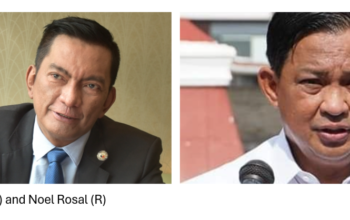By: Joey Sarte Salceda
Foreign policy is not foreign to the country’s domestic interest. Most of our emerging problems are global. Climate change necessarily requires global solutions. Our security issues are necessarily inter-state in nature.
As such, a country like the Philippines, one of the world’s largest labor exporters, as well as a maritime state highly dependent on access to sea routes and marine resources, cannot afford to have senior leadership ignore the country’s place in matters of international concern.
The April 3 presidential debate involved questions on the role that the Association of Southeast Asian Nations (ASEAN) will play in resolving disputes around the waters of the West Philippine Sea. Presidential candidates emphasized the difficulty of getting the ASEAN to solve the question.
Frustratingly, however, the debate format makes it nearly impossible to thresh out the full complexities of the issue, and to expound on new approaches to the problem.
The candidates were asked this question: “What will you do to convince the ASEAN countries to unite to prevent China’s continued militarization of the various West Philippine Sea islands?”
First of all, the question appears to me to be non-central to the West Philippine Sea issue. Former Secretary Bert Gonzales correctly pointed out that there are a couple of countries in ASEAN that tend to take the side of China on most international matters. If I may venture a guess about which countries those two are – Laos and Cambodia – they do not have claims on the South China Sea. The process, then, can completely exclude them. As such, the question of resolving the West Philippine Sea issue through ASEAN appears to me to miss the point. Why do it through ASEAN even?
Secondly, if the question pertains to China’s incursion into our islands in the country’s supposed sovereign waters or its Exclusive Economic Zone, and not the unsettled claims among ASEAN members, then it is a matter primarily between the Philippines and China. We will need to solve it with or without ASEAN assistance.
I was thus quite disappointed that the need for a credible defense posture, particularly strong and modern open sea, air, and coastal water defense, was not discussed. I view it as weakening of our bargaining position that we appear to have multilateral diplomacy as our only option.
As we now learn from the Ukraine situation, a country must always be prepared to defend against potential adversaries, even when they are disproportionately larger and more powerful. I call strategic defense “the iron glove of diplomacy.” Any peace only works if it can be enforced. Talks have to pack a punch.
Thirdly, the discussions made clear that we lack adequate plans to exploit the West Philippine Sea. The defense of the West Philippine Sea has almost always been framed as an issue of cost: how many lives we can risk, how much we should spend on defense, and whether we can bear the costs of war. We have not discussed it from what appears to be China’s perspective, which is a matter of potential benefits. What’s in it for us, as a nation-state?
The only way I can see a live-and-let-live or modus vivendi arrangement happening in the South China Sea among claimant states is when we can come up with an agreement on the allocation of its fruits.
If the free flow of trade can be guaranteed, the allocation of marine resources made fair and sustainable, and the exploration and use of West Philippine Sea hydrocarbons can be figured out among claimant parties, there will be very little need or incentive for conflict, on both China’s end and ours.
The ASEAN is a very potent forum, but it’s just that: one of the many forums. It is not a security alliance, a mutual defense zone, or an entity with quasi-sovereign powers.
Sensible thinking about the West Philippine Sea requires leveling our expectations about the organization. We can’t just say “West Philippine Sea is ours” without assuming the corresponding responsibility that anything to do with the West Philippine Sea is mainly our problem, not ASEAN’s, not the US’s, and not UN’s.
Although I take the position that we should not rely too much on the Hague arbitral ruling on the West Philippine Sea, Vice President Robredo was close to what I think is the proper attitude on this issue when she said we should be the one to take the lead on the matter, not just ASEAN.
That acknowledgment of primary responsibility should guide our diplomacy, our defense policy, and even our resource extraction policy on the West Philippine Sea. On this matter, I rather like the formulation that most barangays (or Philippine villages) use: “Tapat mo, linis mo.” [Take care of your own lawn]-(The Philippine Star)
— (Rep. Joey Sarte Salceda is a senior member of the Philippine House of Representatives, and serves as chairman of its Ways and Means Committee. Being involved in international affairs, Salceda was the first Asian co-Chairman of the United Nations Green Climate Fund, sat in various Philippine delegations on trade and international finance discussions, is currently advisor to the government of the Incheon Metropolitan City, and a guest author of think tank Stratbase ADR Institute.)








